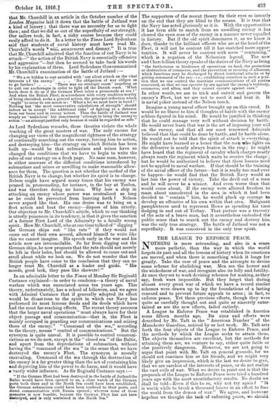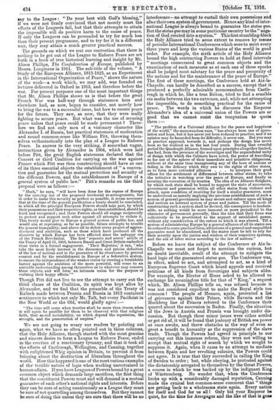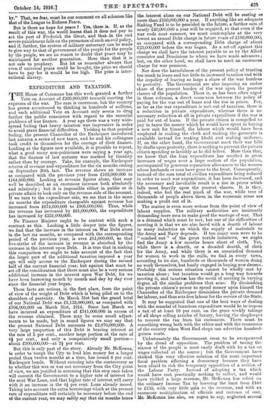THE LEAGUE TO ENFORCE PEACE. N OTHING is more astounding, and
also in a sense more pathetic, than the way in which the world forgets its past and all the lessons of history when its emotions are moved, and when there is something which it longs for greatly. Take the case of peace and the attempts to devise some scheme for abolishing war. Men see the horror and the wickedness of war, and recognize also its folly and futility. At once they set to work devising schemes for making, as they say, fresh wars impossible. But they forget that during almost every great war of which we have a record similar schemes were drawn up to lay the foundations of a lasting concord and to prevent future appeals to arms ; in fact, to enforce peace. Yet these previous efforts, though they were quite as carefully thought out and quite as sincerely enter- tained as are the new efforts, failed entirely.
A League to Enforce Peace was established in America some fifteen months ago. Its aims and efforts were described by Mr. Taft in the "American Number" of the Manchester Guardian, noticed by us last week. Mr. Taft sets forth the four objects of the League to Enforce Peace, and the methods by which the League seeks to attain them.
The objects themselves are excellent, but the methods for attaining them are, we venture to say, either quite futile or else positively dangerous. However, we are not going to argue that point with Mr. Taft on general grounds, for we should not convince him or his friends, and we might very likely give an impression, which is the last we desire to give, that we are careless of the interests of peace, or do not realize the vast evils of war. What we desire to point out is that the proposals of the League to Enforce Peace were tried a hundred years ago with the most unsatisfactory results. No doubt we shall be told—Even if this be so, why not try again ? "It is worth while to break a thousand lances in an effort to free the world from the demon of war." We agree, and however hopeless we thought the task of enforcing peace, we should. say to the League : "Do your best with God's 'blessing," if we were not firmly convinced that not merely must the efforts of the Leaguers fail, but that their attempts to attain the impossible will do positive harm to the cause of peace. If only the Leaguers can be persuaded to try for much less than their present programme, and to try for it in a different way, they may attain a much greater practical success.
The grounds on which we rest our contention that there is nothing to be got out of the League to Enforce Peace are set forth in a book of true historical learning and insight by Mr. Alison Phillips, The Confederation of Europe, published by Messrs. Longmans in 1914. The sub-title of the volume, "A Study of the European Alliance, 1813-1823, as an Experiment in the International Organization of Peace," shows the nature of the work—a work which, we may add, was founded on lectures delivered in Oxford in 1913, and therefore before the war. For present purposes one of the most important things • that Mr. Alison Phillips shows us is that before the great French War was half-way through statesmen here and elsewhere had, as now, begun to consider, not merely how to bring the war to a successful issue, but how to ensure peace for the future. They saw, as now, that they were really fighting to secure peace. But what was the use of securing • peace unless that peace could be made permanent? There- fore we find not only men of a visionary character like Alexander I. of Russia, but practical statesmen of moderation and sound common-sense like William Pitt, throwing them- selves enthusiastically into the plan of a League to Enforce Peace. In answer to the very striking, if somewhat vague, instructions given by Alexander in 1804, which were laid before Pitt, the great English statesman declared that the Concert or third Coalition for carrying on the war against France which Pitt was then constructing should have as one of its three essential objects the establishment of "a conven- tion and guarantee for the mutual protection and security of the different Powers, and the establishment in Europe of a . general system of public law." Pitt's remarks on the third proposal were as follows :—
Much," he says, "will have been done for the repose of Europe by the carrying out of the proposed territorial re-arrangements, but in order to make this security as perfect as possible, it seems necessary
• that at the time of the general pacification a treaty should be concluded, in which all the principal European Powers should take part, by which their possessions and their respective rights, as then established, should be fixed and recognized ; and these Powers should all engage reciprocally to protect and support each other against all attempts to violate it. This treaty would give to Europe a general system of public law, and would aim at repressing, as far as possible, future attempts to trouble the general tranquillity, and above all to defeat every project of aggran- dizement and ambition, such as those which have produced all the disasters by which Europe has been afflicted since the unhappy era of the French Revolution. The first separate and secret article of the Treaty of April 11, 1805; between Russia and Great Britain embodied these views in a formal engagement. 'Their Majesties,' it ran 'who take the most lively interest in the discussion and precise definition of the law of nations and in the guarantee of its observance by general consent and by the eatablishment in Europe of a federative ystem, to ensure the independence of the weaker states by erecting a formidable barrier against the ambition of the more powerful, will come to an amicable understanding among themselves as to whatever -may concern
• these objects, and will form an intimate union 'for the purpose of realizing their happy effects?"
Though Pitt did not live to-see-the attempt to carry out the third clause of the Coalition, its spirit was kept alive by • Alexander, and we find that the preamble of the Treaty of Kalisch made between Prusgia and Russia in 1813 contained sentiments to which not only Mr. Taft, but -every Pacificist in the New World or the Old, would gladly agree :— " The time will come when treaties shall be more than truces, when
• IC will again be poSeible for • them to be observed with that religious faith, that sacred inviolability, on which depend the reputation, the strength, and the preservatioa of empires."
-We are not going to weary our readers by pointing out again, what we have so often pointed out in -these columns, that the Holy Alliance, though started with the most genuine and sincere desire to form a League to Enforce Peace, ended in the erection of a reactionary tyranny, And-that it took all the efforts of Castlereagh, Wellington, and Cannhig, together with enlightened Whig opinion in Britain; to prevent it from bringing about the destruction of liberalism throughout the • world. How this happened is one of the most curious examples of the terrible nature of logic when working unrestrained in htunan affairs. If you have Leagues of Powers bound by a great common object which demands large sacrifices, the first thin that the constituent Powers must and will demand is a mutual guarantee of each other's national rights and interests. Before they can be sure of acting unanimously as a League they must he sure of not quarrelling among themselves. But they cannot be sure of doing this unless they are Rae that there will be no interference—no attempt to curtail their own possessions and alter their own system of government. Hence any kind of inter- national League is always bound to guarantee the status quo. But the status quo may in some particular country be the " nega- tion of God erected into a system." This-first stumbling-block the Holy Alliance tried to some -extent to remove by means of periodic International Conferences which were to meet every three years and keep the various States of the world in good order. For example, the sixth article of . the Holy Alliance bound the high contracting Powers to hold at fixed intervals "meetings consecrated to great common objects and the examination- of 'such measures as at each one of these epochs shall be judged most salutary for the peace and prosperity of the nations and for the maintenance of the peace of Europe." The first of these meetings, the Conference held at Aix-la- Chapelle, can hardly be described as a success, except that it produced a perfectly admirable memorandum from Castle- reagh in which he, like a true Briton, tried to find a sensible via media between the two extremes, and, while not attempting the impossible, to do something practical for the cause of peace. The words in which he discusses the Emperor Alexander's idea of a universal union of the Powers are so good that we cannot resist the temptation to quota them :— " The problem of a Universal Alliance for the peace and happiness of the world," the memorandum rims, "has always been one of specu- lation and hope, but it has never yet been reduced to practice, and if an opinion may be hazarded from its difficulty, it never can. But you may in practice approach towards it, and perhaps the design has never been so far realized as in the last four years. During that eventful period the Quadruple Alliance, formed upon principles altogether limited, has had, from the presence of the sovereigns and the unparalleled unity of design with winch the Cabinets have acted, the power of travelling so far out of the sphere of their immediate and primitive obligations, without at the same time transgressing any of the laws of nations or failing in the delicacy which they owe to the rights of other states, as to form more extended alliances . . . to interpose their good offices for the settlement of different:mg between other states, to -take the initiative in watching over the peace of Europe, and finally in securing the execution of its treaties. The ides of an Alliance by which each state shall be bound to support the state of succession, government and possession within all other states from violence and attack, upon condition of receiving for itself a similar arantee, must be understood as morally implying the previous establis •ent of such a system of general government as may secure and enforce upon all kings and nations an internal system of peace and justice. Till the mode of constructing such a system shall be devised, the consequence is insAmis- Bible, as nothing would be more immoral or more prejudicial to the character of government generally, than the idea that their force was collectively to be prostituted to the support of established power, without any consideration of the extent to which it was abused. Till a system of administering Europe by a general alliance of all its states can be reduced to some practical form, all notions of a general-and-unqualified guarantee must be abandoned, and the states must be left to rely for their security upon the justice and wisdom of their respective systems, and the aid of other states according to the law of nations."
Before we leave the subject of the Conference at Aix-la- Chapelle we must not forget to mention the curious, but no doubt inevitable, result of the attempt to mitigate the hard logic of the guaranteed status quo. The Conference was, in effect, asked to act, and attempted to act, as a kind of European Supreme Court which heard appeals and received petitions of all kinds from Sovereigns and subjects alike. For example, the Elector of Hesse asked to be allowed to exchange his Meaningless title for that of "King," a request which, Mr. Alison Phillips tells us, was refused because it was not considered expedient to make the Royal style too common! The people of 'Monaco, again, presented a list of grievances against. their Prince, while Bavaria and the Hochberg line of Princes- -referred to the Conference their quartel about the succession in Baden. Finally, the situation of the JeWs. in Austria and Prussia was brought under dis- cussion. But though these minor 'issues were either settled or got rid of, it Will be found.that jealousy of British sea power at once awoke, -and threw obstacles in the way of even so great a benefit to humanity as the suppression- of the slave trade. Though the Powers had agreed in principle to our carrying out this immense reform, they Were not willing to accept that mutual right of search by which We sought to suppress it. Again, when it came to an attempt to mediate between Spain- and her revolting colonies, the Powers could not agree. It is -true that they succeeded in calling the King of Sweden to order ; but; while obeying, he protested against the dictatorship arrogated to themselves by the Great Powers, a course in which he was backed up by the indignant King of Wurttemberg. No wonder that, -when the Conference broke up with a considerably damaged reputation, Canning made the cynical but common-sense comment that "things are getting back to a wholesome state again. Every nation for itself and God for us all! Only bid your Emperor be quiet, for the time for Areopagus and the like of that is gone — ---- - by." That,.welear,.mustle.our.comnient.en all schemes like that of the League to Enforce Peace. But is there no hope for peace Yes, these is. If, as the result of this. war, the world learns -that it does not pay to act the part of Frederick the Great, and that–in the end severe punishment falls on the promoters of such an evil policy, and if, further, the system of military autocracy can be made to give way to that of government of the people for the people by the people, we see no reason to doubt that peace may be maintained for another generation. More than that it is not safe to prophesy. But let us remember always that even if universal peace could be bought, the price we should have to pay for it would be too high. The price is inter- national slavery.




































 Previous page
Previous page